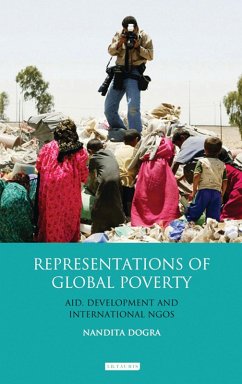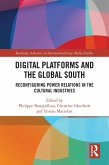Through the efforts of increasingly global and media-aware NGOs, people in the west are bombarded with images of poverty, suffering and inequality. Representations of Global Poverty is the first comprehensive study of the communications and imagery used by international NGOs to represent the developing world. An enlightening study, this book explores the discursive constructions of global poverty and development by international charities and their role in mediating between developed countries and the developing world. It presents a detailed empirical review of the communications of international NGOs, utilizing an original postcolonial analytical framework to better understand and evaluate these public messages.
The book examines three interlinked levels of the public messages of UK-based international
development NGOs (INGOs) - representation, production and reception. This review of the
fundraising and advocacy messages of INGOs shows a dualism of 'difference' and 'oneness'. While these messages portray the developing world as different and distant, they are also at pains to present it as sharing the same human values. These oversimplified representations circumvent the historical context of, and continuities between, European colonialism and current global poverty. Instead they connect the globe through a de-historicised universal humanism. This decontextualization in INGOs' communications stems from both institutional isomorphism and sociological assumptions about audiences.
Dogra's book goes on to reveal the role of western collective histories in shaping global inequalities and our subjectivities in the way we perceive and position ourselves in relation to the majority world. From historical amnesia to denial, charity to justice and rights, feel-good consumerism to activism, humanism and cosmopolitanism to Eurocentrism and Britishness, it analyses NGO representations through a variety of discourses. Boldly interdisciplinary, the book draws upon sociology, NGO management, development, social policy, political science, postcolonial, cultural and media studies and as such is essential reading for students and scholars across these diverse fields. This book should become the starting point for future debates on representations and global poverty that concern not just charities, international aid bodies, governments and academic institutions but all of us who live in a deeply connected but divided world.
The book examines three interlinked levels of the public messages of UK-based international
development NGOs (INGOs) - representation, production and reception. This review of the
fundraising and advocacy messages of INGOs shows a dualism of 'difference' and 'oneness'. While these messages portray the developing world as different and distant, they are also at pains to present it as sharing the same human values. These oversimplified representations circumvent the historical context of, and continuities between, European colonialism and current global poverty. Instead they connect the globe through a de-historicised universal humanism. This decontextualization in INGOs' communications stems from both institutional isomorphism and sociological assumptions about audiences.
Dogra's book goes on to reveal the role of western collective histories in shaping global inequalities and our subjectivities in the way we perceive and position ourselves in relation to the majority world. From historical amnesia to denial, charity to justice and rights, feel-good consumerism to activism, humanism and cosmopolitanism to Eurocentrism and Britishness, it analyses NGO representations through a variety of discourses. Boldly interdisciplinary, the book draws upon sociology, NGO management, development, social policy, political science, postcolonial, cultural and media studies and as such is essential reading for students and scholars across these diverse fields. This book should become the starting point for future debates on representations and global poverty that concern not just charities, international aid bodies, governments and academic institutions but all of us who live in a deeply connected but divided world.









